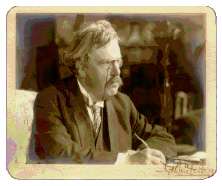 Isn't the answer obvious?
Isn't the answer obvious?Even C.S. Lewis looked to Chesterton as his spiritual father. About him, Lewis wrote:
"The contemporary book that has helped me the most is Chesterton's The Everlasting Man." (God in the Dock, p.260).
Here are some of his thought-provoking, memorable thoughts:
Chesterton on Courage: “Courage is almost a contradiction in terms. It means a strong desire to live taking the form of a readiness to die."
Chesterton on Atheists and God: "The worst moment for the atheist is when he is really thankful and has no one to thank."
Chesterton on Man and Modesty: “In one way man was to be haughtier than he had ever been before; in another way he was to be humbler than he had ever been before. In so far as I am a man I am the chief of creatures. In so far as I am a man, I am the chief of sinners. All humility that had meant pessimism, that had meant man taking a vague or mean view of his whole destiny--all that was to go. We were to hear no more the wail of Ecclesiastes that humanity had no pre-eminence over the brute, or the awful cry of Homer that man was only the saddest of all the beasts of the field. Man was a statue of God walking about the garden. Man had pre-eminence over all the brutes; man was only sad because he was not a beast, but a broken god."
Chesterton on the Failure of the Church: "The Christian ideal has not been tried and found wanting. It has been found difficult and left untried" Yancey's commentary: Chesterton readily admitted that the church had badly failed the gospel. In fact, he said, one of the strongest arguments in favor of Christianity is the failure of Christians, who thereby prove what the Bible teaches about the Fall and original sin. As the world goes wrong, it proves that the church is right in this basic doctrine.
Chesterton on Progress: "Everyone is interested in making things better. But what does "better" mean? Nature cannot answer this question, for nature accepts things as they are without making value judgments. Nor does the mere passage of time guarantee progress. Any meaningful sense of progress must come from a definite vision of how things should be, a point toward which we can move . . . A belief in the inevitability of progress is the best reason not to be progressive. For in that case we need do nothing at all. The best reason for being progressive is that things tend to get worse . . . Christianity answers these three challenges of progress. 1. It fixed the ideal before the foundation of the world. 2. It can give us the complex picture of life toward which we should move. 3. And its doctrine of original sin alerts us to the need to work toward that ideal."
Chesterton on Christian Theology (or Paradox): "Christianity got over the difficulty of combining furious opposites by keeping them both and keeping them both furious." Yancey's commentary: "Throughout church history, Christian leaders have shown an impulse to pin everything down, to reduce behavior and doctrine to absolutes that could be answered on a True/False test . . . Uncomfortable with paradox, Christians tend to tilt in one direction or the other, usually with disastrous consequences . . . The first shall be last; find your life by losing it; work out your salvation with fear and trembling, for it is God who works in you; he who stoops lowest climbs highest; where sin abounds grace abounds more—all these profound principles of life appear in the New Testament and none easily reduces to logical consistency. "Truth is not in the middle, and not in one extreme, but in both extremes," 19th-century British pastor Charles Simeon remarked. With some reluctance, I have come to agree."
No comments:
Post a Comment